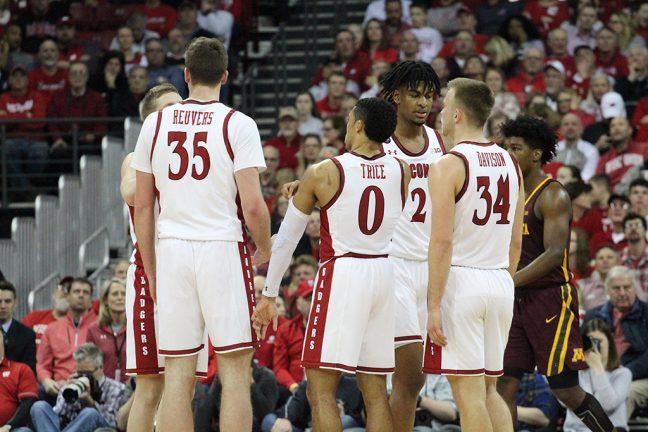The University of Wisconsin men’s basketball team’s 2019-20 season was a rollercoaster in the truest sense of the word.
While the Badgers season ended prematurely due to the COVID-19 pandemic, the team rebounded after a rough start and finished the regular season with a 21-10 record, going 14-6 in the Big Ten to capture a three-way share of their first regular-season title in five years.
Whether it was junior guard Kobe King’s decision to leave the team or the resignation of UW’s strength and conditioning coach due to accusations of him using a racial slur, the beginning of the season had many sports analysts and fans alike writing off the Badgers, citing coaching and player development issues as reasons for the team’s struggles.
This criticism, while harsh, was increasingly valid as the Badgers closed out the first month of their season with a 4-4 record, showing great inconsistencies in their play marked by losses against less-talented programs such as Richmond, New Mexico State and North Carolina State.
The squad finished the remainder of 2019 with a 4-1 record, and started 2020 off with a bang, defeating No. 5 Ohio State in Columbus 61–57. This momentum carried the team throughout the remainder of the season, leading them to a 12-5 record with marquee wins against nationally-ranked Maryland, Michigan State and Michigan. The Badgers won their final eight games, helping them secure the No. 1 seed in the Big Ten tournament, which was set to begin on March 11.
While there is no doubt the disappointment of the season ending early is immeasurable, the 2019-20 season was one to be proud of. The team battled through many seemingly impervious obstacles, and the resiliency and determination they maintained as a group is nothing to bat an eye at.
One key reason for Wisconsin’s late-season bounceback was the stellar play of junior transfer Micah Potter, who averaged 10.1 points, 6.2 rebounds and 1.0 blocks per game during his first season as an eligible member of the team. Starting off the season on the bench, the spark he provided whenever he was inserted into the Badgers’ lineup was undeniable, leading to him becoming a key member of the squad down the stretch.
Another essential player during Wisconsin’s eight-game win streak to close out the season was junior guard D’Mitrik Trice, whose 28 points and four assists against Michigan helped secure the victory and propel the team to the top of the Big Ten standings.
While these few players were pivotal in terms of the team’s success, the Badgers’ remarkable turnaround was truly due to the ability of the squad to come together as one unit and win tightly contested games together, not as individuals. This aspect of the team is what Head Coach Greg Gard chose to hone in on during an interview with the Big Ten Network March 9.
“The chemistry, camaraderie, and unification of the team has grown immensely,” Gard said. “They’ve played so unselfishly, they’ve just concerned themselves with what’s on the front of the jersey, they don’t care who gets the credit, they don’t care who gets the points as long as Wisconsin is successful.”
After calls for Gard to be fired emerged among analysts and Badger fans alike in late January, Gard led the team to success despite the loss of King, culminating in a Big Ten Coach of the Year Award selection.
When asked how the team moved forward after the unfortunate departure of King, Gard once again stressed the importance of the Badgers’ unification.
“I think they came together, they understood that the whole is greater than the sum of the parts,” Gard said. “Once they figured that out and truly believed in that, they just took off.”
Gard went on to acknowledge that while no Badgers were selected to the All-Big Ten first or second teams, they were able to find their success as a committee.
In the last eight games of the regular season, no single player scored the most points more than twice, as junior Nate Reuvers put up 11 points against Northwestern and 17 points against Indiana, and junior Brad Davison dropped 30 points against Nebraska and 20 points against Minnesota.
“They’ve just understood that if we bond together, we stick together, we stay true to who we are, and we continue to work, great things can happen,” Gard said. “This is the ultimate definition of what a team can accomplish when they work together.”
The Badgers were primed to make a deep postseason run, and while the squad no longer has a chance to capture the Big Ten championship and make a run towards the Final Four, the accomplishments and strides they took throughout the regular season offers great hope for the future of Wisconsin’s basketball program.


